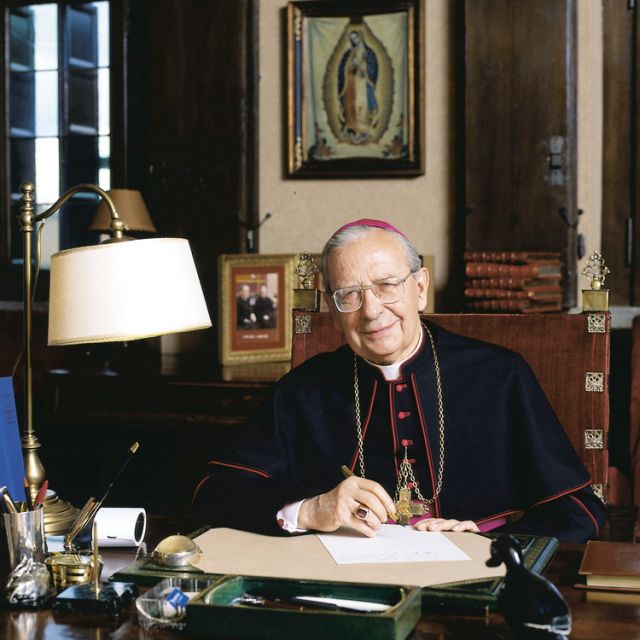Before the Spanish-born bishop can be beatified, the Vatican must recognize that a miracle has occurred through his intercession. A possible miracle has been submitted to the Vatican for study by theological and medical experts.
In general, the church must confirm two miracles before sainthood is declared, the first for beatification and the second for canonization.
Msgr. Capucci, who as postulator assists in the investigation of the potential saint's life and virtues, as well as of any miracles attributed to his intercession, said the documentation presented to the Vatican on behalf of Bishop del Portillo's cause comprised 2,530 pages in three volumes.
In all, 133 witnesses were interviewed, including 19 cardinals and 12 bishops or archbishops, he said. Only 62 of the witnesses belong to Opus Dei, an organization of laity and priests dedicated to spreading the message that work and the circumstances of everyday life are occasions for growing closer to God, for serving others and for improving society.
Interviews took place in Madrid and Pamplona, Spain; Fatima-Leiria in Portugal; Montreal; Washington; Warsaw, Poland; Quito, Ecuador; and Sydney, as well as in Rome, he said.
To "more scrupulously guarantee neutrality in the whole process," Msgr. Capucci said, two parallel investigations of Bishop del Portillo's life were carried out. One was by the Personal Prelature of Opus Dei and the other was by the Vicariate of Rome, whose tribunal members interviewed "the principal co-workers of Bishop del Portillo in the government of Opus Dei."
The postulator said Bishop del Portillo's "reputation for holiness can truly be called a churchwide phenomenon," not limited to Opus Dei members.
"We have received 12,000 signed accounts of favors received, attributed to his intercession, very often from countries in which Opus Dei is not as yet established," Msgr. Capucci said. "The newsletter about his cause for canonization has reached 5 million copies in print; 10 million prayer cards for private devotion have been distributed worldwide."
Born March 11, 1914, in Madrid, Alvaro del Portillo earned a civil engineering degree and worked in several state water authorities while also studying philosophy, literature and history. He completed a doctorate on the early exploration of the California coast in 1944.
He joined Opus Dei in 1935, seven years after its founding by St. Josemaria Escriva, and received his formation directly from the founder. He was ordained a priest on June 25, 1944.
After the death of St. Josemaria in 1975, Father del Portillo was elected to succeed him as the head of Opus Dei. When Blessed John Paul II erected Opus Dei as a personal prelature in 1982, he appointed Father del Portillo as its prelate. The pope named him a bishop in 1990.
Under his leadership, Opus Dei began work in 20 new countries. As prelate, Bishop del Portillo inspired the start of many social and educational initiatives, including the Monkole Medical Center in Kinshasa, Congo; the Niger Foundation Hospital in Enugu, Nigeria; the Center for Industrial Technology and Enterprise in Cebu, Philippines; and the Pedreira Educational and Professional Center in Sao Paulo.
Bishop del Portillo died in Rome March 23, 1994, and his cause for canonization was opened 10 years later.

